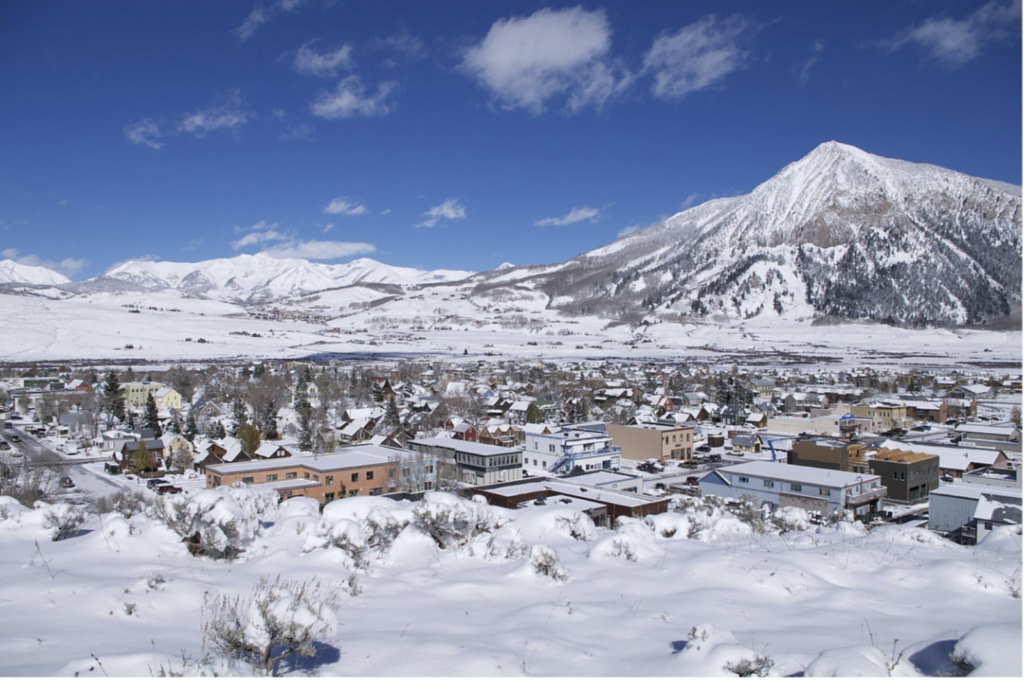Crested Butte, Colorado is a small town of less than 2,000 people nestled in the Rocky Mountains, over 220 miles southwest of Denver. A former coal mining town, Crested Butte draws locals and tourists alike as the gateway to the nearby Crested Butte Mountain Resort for skiing and snowboarding. Town leadership is balancing transportation needs for locals and tourists during peak and off-peak seasons with a more sustainable approach that reduces the emphasis on cars and parking. Transportation is a significant source of CO2 emissions nationwide and the ease of driving encourages urban sprawl. Alternative transport options to driving need to be reliable for residents to travel to home, work, and more. The promise of these alternatives includes less release of CO2 from car tailpipes and improved air quality (NCA5 2023).

Photo credit: Chris Segal
Parking is a major component of Crested Butte’s push to transform its transportation system. Over ¾ of Crested Butte households own up to 2 vehicles and over half of residents in the broader Gunnison Valley commute alone by car for work. Over 2,600 parking spaces are on-street public parking, with over 2,000 additional spaces for off-street private residential parking. In contrast, there are only 488 off-street public parking spaces. Downtown streets such as Elk Avenue and Second Street are popular spots at the same time, creating challenges to find parking (CB Plan 2024). Yet the current availability of parking still encourages driving over other transport modes. Over the past 5 years, there have been 149 parking collisions as compared to 33 vehicle to vehicle collisions, demonstrating that parking increases the risk of collision (CB Plan 2024). In March 2024, the town of Crested Butte approved a Transportation Mobility Plan. Included in the Plan is the focus on how parking is a challenge as well as an opportunity to meet the moment. While the town has historically not managed parking, recent efforts include enforcement of 2-hour parking on Elk Avenue and a residential neighborhood permit program for 2 streets. As a result, there is increased turnover on Elk Avenue, greater utilization of parking downtown, and reduced neighborhood impacts from Elk Avenue spillover (CB Plan 2024). My colleague Kathleen Maeder and I are assessing which parking reforms the town should prioritize. A feasible opportunity is creating parking minimums and maximums. Currently, there are only absolute parking requirements. Eliminating those requirements would be a significant signal toward parking reform because it creates opportunity for fewer parking spaces, thus incentivizing transit use, cycling, or walking. Based on the current success of 2-hour parking enforcement on Elk Avenue, expanding enforcement to other parts of town and charging a fee could finance transit enhancements and better distribute parking utilization across town. The student research assistant team at Ucross High Plains Stewardship Initiative is excited to explore these options and others, eventually producing a set of recommendations to the town in spring 2025.
References
Crested Butte, Colorado. 2024. Crested Butte Transportation Mobility Plan.
https://www.crestedbutte-co.gov/vertical/Sites/%7B6058FFBB-CB06-4864-B42F-
B476F794BE07%7D/uploads/TMP_FINAL_Adopted_3.4.24(1).pdf
Liban, C.B., R. Kafalenos, L. Alessa, S. Anenberg, M. Chester, J. DeFlorio, F.J. Dóñez,
A. Flannery, M.R. Sanio, B.A. Scott, and A.M.K. Stoner, 2023: Ch. 13. Transportation.
In: Fifth National Climate Assessment. Crimmins, A.R., C.W. Avery, D.R. Easterling,
K.E. Kunkel, B.C. Stewart, and T.K. Maycock, Eds. U.S. Global Change Research
Program, Washington, DC, USA. https://doi.org/10.7930/NCA5.2023.CH13
Travel Crested Butte. 2024. Crested Butte, Colorado: A Mountain Paradise.
https://travelcrestedbutte.com/crested-butte-colorado-mountain-paradise
STUDENT RESEARCHER

Joshua Hernandez – Research Assistant | Joshua is a Master of Environmental Management candidate specializing in Business and the Environment. He has experience working in the federal government and environmental consulting, including in development of the Fifth National Climate Assessment, an interagency report detailing the state of science of climate change impacts and solutions in the United States. Interests include resource management of a growing American West, continued decarbonization of the energy sector, nature-based solutions, and corporate sustainability. A Chicago native, Joshua has a B.A. in Environmental Studies from Amherst College and can be found kayaking, hiking, and playing a range of sports. See what Joshua has been up to.
